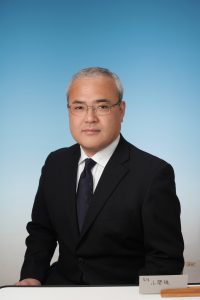This is the thirteen in the series of short statements from candidates in the forthcoming CODATA Elections. Toshihiko Koseki is a new candidate for the CODATA Executive Committee as an Ordinary Member. He was nominated by the Japan CODATA National Committee.
I am currently a professor of materials engineering at the University of Tokyo as well as an  executive director and vice president of the university. I am also a member of CODATA Japan, for which I have served as vice chair since last year. Prior to this I had been working in industry for twenty-years as a researcher of materials and welding engineering. Based on the background, I served as the chairman of a committee of welding metallurgy in IIW (International Institute of Welding) over ten years until recently, and organized and chaired annual conferences and associated meetings of the committee as well as some other international conferences in the world over 30 times as a total. Those activities have brought me not only many honorary member positions of AWS, AMS and others, but also a strong network of materials scientists and engineers in the world.
executive director and vice president of the university. I am also a member of CODATA Japan, for which I have served as vice chair since last year. Prior to this I had been working in industry for twenty-years as a researcher of materials and welding engineering. Based on the background, I served as the chairman of a committee of welding metallurgy in IIW (International Institute of Welding) over ten years until recently, and organized and chaired annual conferences and associated meetings of the committee as well as some other international conferences in the world over 30 times as a total. Those activities have brought me not only many honorary member positions of AWS, AMS and others, but also a strong network of materials scientists and engineers in the world.
Drawing on these activities and achievements in my career, I would like to make a very serious contribution to CODATA because I believe important transformations through data will take place in this century. The current ICT era we witness buzz words like Big Data, Open Science, Industry 4.0, IoT, FinTech, AI, but we need to move towards concrete actions and face the challenges posed by these profound changes, building a strong and enduring response in the way we do data and science.
Relatedly, I am currently the leader of a nation-wide research project on materials data and informatics funded by the Japanese government, in which we are constructing database for different structural materials in collaboration with a number of universities, national laboratories and companies, and trying to connect the database with different multiscale numerical simulations to better predict the microstructure and performances of the materials and to effectively support the development of new structural materials for industries. I would like to use this project as a showcase of concrete exemplars dealing with complexities of data and deriving values from data. I think this will be valuable for the CODATA community from two viewpoints. The first viewpoint is to demonstrate the leading edge of data science in dealing with complexity of data by taking advantage of our case studies on structural materials, with the expectation that our challenges, tools and outcomes can be referred to as a good practice by other projects concerning data science in other academic disciplines. The second viewpoint is how to design business models adaptively in the current ICT environments of big divides among diversified stakeholders in the world. CODATA has played a leading role for promoting data principles and policies, but these are not always easy to put into practice in the real world. How to manage and harmonize conflicts on data among different stakeholders is not an issue only for our project, but a serious and continuous issues for all.
If elected as a member of Executive Committee of CODATA, I would like to contribute to the discussions of database policy and structure that could be a common issue in different engineering fields where data and database have both scientific importance and engineering usefulness but both scientific and engineering complexity at the same time. Data and database of structural materials are a typical instance to be discussed, and thus, I have proposed a TG about this subject. It is noted that, since the construction of such engineering database is not possible only by universities and national laboratories but needs contributions by industries in many cases, the discussion of database in engineering fields is quite different from that in fundamental science. The discussion of database in engineering should take into consideration the standpoints of industries and should encourage the involvement of industries. I currently have a number of industry members in my national project and in a big network of international experts, and thereby I believe I will be able to share my past and current experiences with industries in the discussion at CODATA. So I would like to work together with CODATA colleagues so as to create a sound ecology of scientific data for all.
